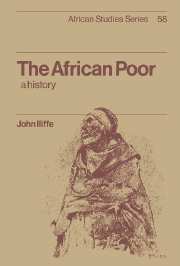Book contents
- Frontmatter
- Contents
- Preface
- 1 The comparative history of the poor
- 2 Christian Ethiopia
- 3 The Islamic tradition
- 4 Poverty and power
- 5 Poverty and pastoralism
- 6 Yoruba and Igbo
- 7 Early European initiatives
- 8 Poverty in South Africa, 1886–1948
- 9 Rural poverty in colonial Africa
- 10 Urban poverty in tropical Africa
- 11 The care of the poor in colonial Africa
- 12 Leprosy
- 13 The growth of poverty in independent Africa
- 14 The transformation of poverty in southern Africa
- Notes
- Bibliography
- Index
4 - Poverty and power
Published online by Cambridge University Press: 31 October 2009
- Frontmatter
- Contents
- Preface
- 1 The comparative history of the poor
- 2 Christian Ethiopia
- 3 The Islamic tradition
- 4 Poverty and power
- 5 Poverty and pastoralism
- 6 Yoruba and Igbo
- 7 Early European initiatives
- 8 Poverty in South Africa, 1886–1948
- 9 Rural poverty in colonial Africa
- 10 Urban poverty in tropical Africa
- 11 The care of the poor in colonial Africa
- 12 Leprosy
- 13 The growth of poverty in independent Africa
- 14 The transformation of poverty in southern Africa
- Notes
- Bibliography
- Index
Summary
In those areas of pre-colonial Africa beyond the influence of Christianity or Islam, the chief problem in reconstructing the history of the poor lies in the sources. Many regions have no written records until late in the nineteenth century, while most oral traditions focus on dominant groups rather than marginal people. For this reason, this and the two following chapters concentrate on areas with especially rich sources.
Even in these regions, however, the records are difficult to use. They are chiefly of three kinds. One category contains the formal accounts of African peoples written by European visitors, ranging from sixteenth-century traders and missionaries to nineteenth-century travellers and the earliest anthropologists. As the work of foreigners, these accounts may contain misunderstandings. More seriously, as formal accounts they may be coloured by the preconceptions with which the writers approached both Africans in general and the poor in particular, preconceptions often drawn from notions of poverty current in Europe. These sources, it will be suggested, offer stereotypes of African poverty which can be misleading. The same is true, for different reasons, of the oral traditions which form the second category of sources. Where these say anything of the poor, it is often coloured either by ethnic or social stereotypes or by the social conditions existing when the traditions were recorded.
Formal written accounts and oral traditions, taken alone, suggest that poverty was widespread in pre-colonial Africa but differed from that in Ethiopia or the West African savanna.
- Type
- Chapter
- Information
- The African PoorA History, pp. 48 - 64Publisher: Cambridge University PressPrint publication year: 1987

